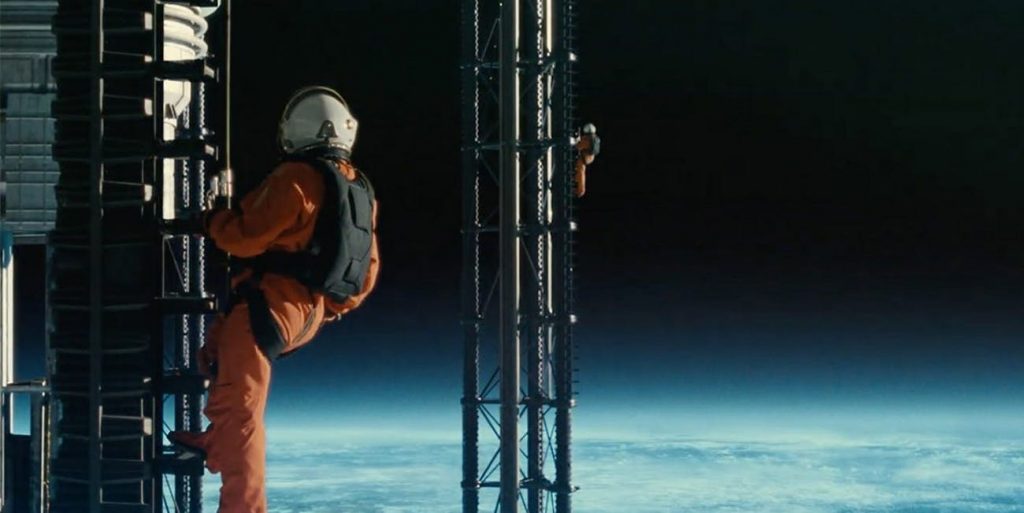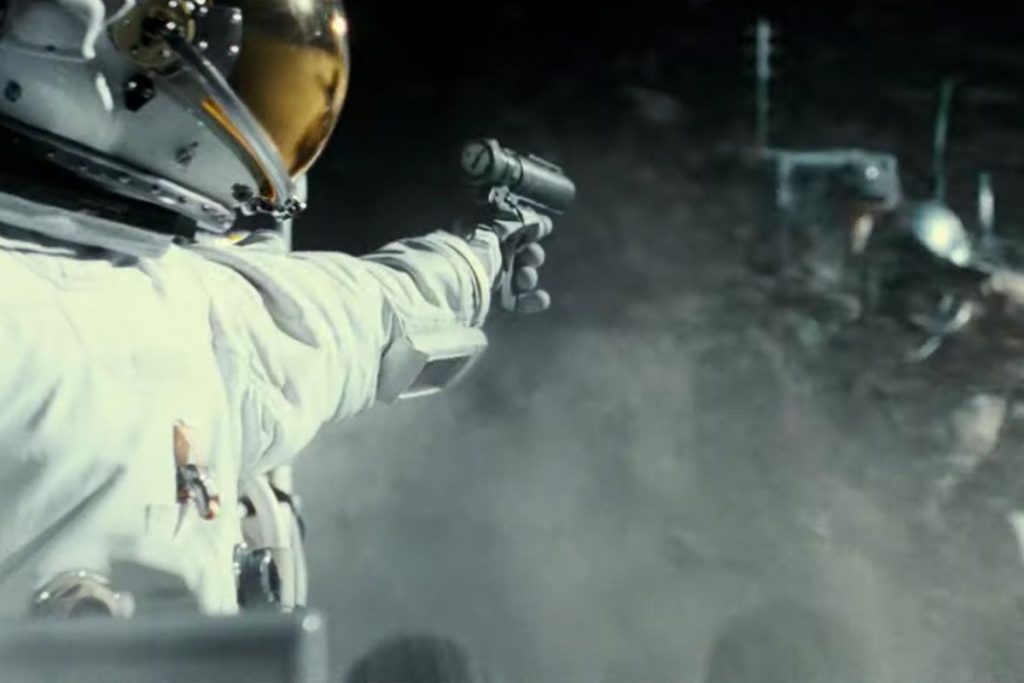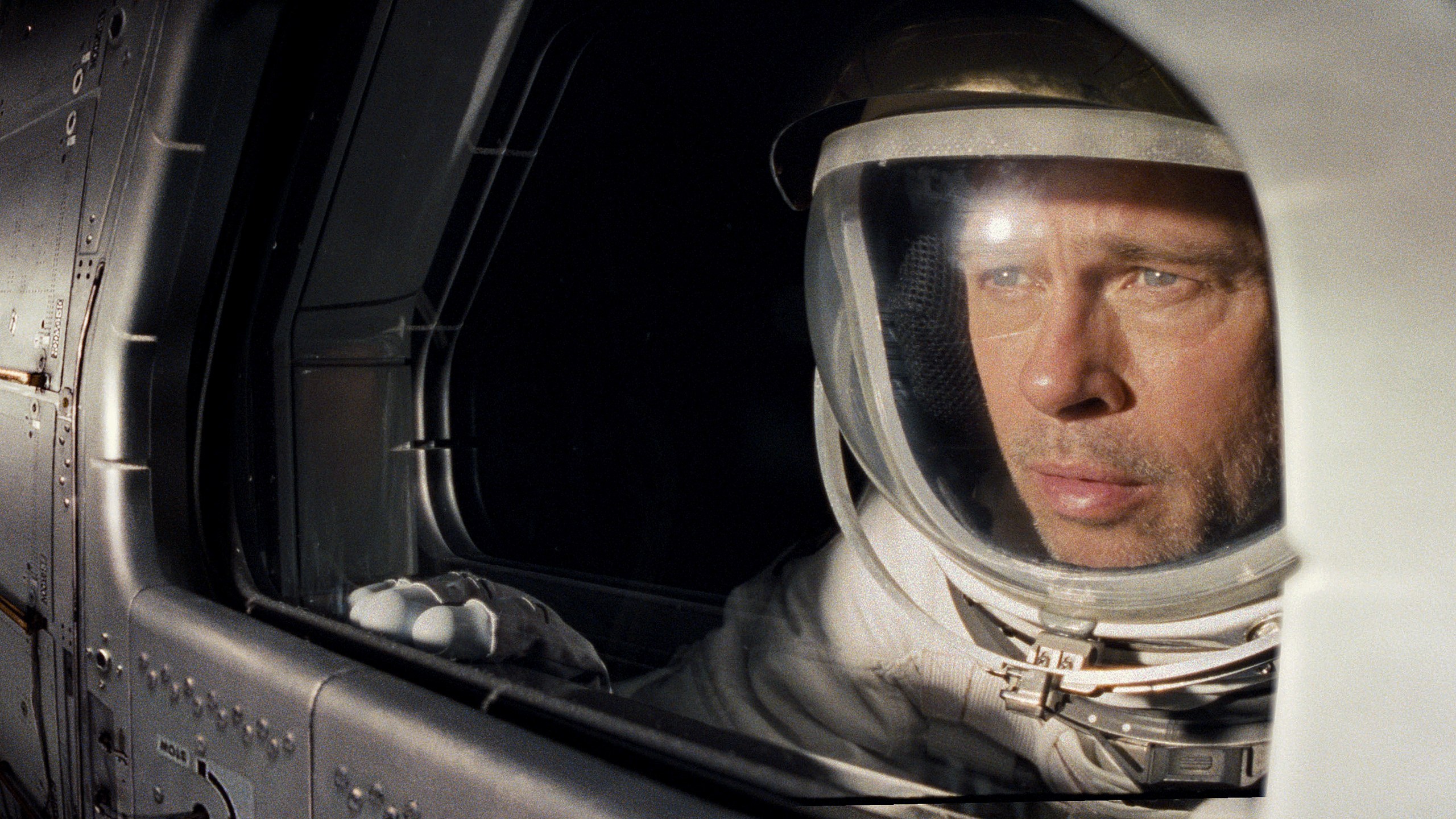Hollywood so rarely attempts a go at intelligent think pieces that I literally found myself – mid-viewing – assuming Ad Astra was something else entirely. It was literally unfolding in front of me, and I still wasn’t comprehending it. Which, sort of explains why so many people are walking into the theater this weekend and are walking out, wondering what the heck just happened to them. I mean, look at Rotten Tomatoes – the audience is scoring it in the sub-basement nether regions of the 40’s. And the critics are scoring it in the upper regions of 80’s?!? What are the hoi polloi missing here? What is happening that we are all so flagrantly missing? Well, that is what we’ll talk about today. First I’ll give you guys a good reason why you should watch – sans spoilers. And then I will walk you through what happened in the film. Getting us all on the same page. And then we’ll discuss the suprasubliminal machinations that are happening here in this film. Sound like a fair game plan? Seems like a tall order to me. So hopefully I’ll be able to deliver on these oversized movie discussion schematics – so shall we? Why Most People Don’t Understand Ad Astra…
What is Ad Astra?
Ad Astra is a movie starring Brad Pitt. Is there any more of a summary that really anyone needs than that? OK. Fine. Sheesh. Astronaut Roy McBride (did I mention this part is played by Brad Pitt?) undertakes a mission across the solar system in order to find his father. Along the way truths are uncovered, and it is eventually uncovered that the Earth is threatened by fallout from McBride the elder’s expedition. Going into greater detail than that would put the mission at risk…OK? So, from here on out, any more further exposition will be given out solely on a need-to-know basis.
But the movie is more of a contemplative piece on our place in the universe. A question, and an answer in the form of a riddle. Roy McBride ventures from Earth, to the moon, out towards Mars, and hopefully beyond to meet his father. And, as we go, we get the feeling like this is a philosophy 101 lecture being doled out movie form. A question on the meaning of life. Our place in the larger universe, and we are confronted with the larger question about alien life, placed on top, like a cherry on a pile of delicious think-piece whip cream.
Please know that this movie isn’t for the Armageddon fan-boy base. It isn’t a movie about Aliens Blasting THEiR WAY tO EArTH! No. This is a movie about a son. It’s a movie about a father. And if that doesn’t seem interesting to you – all the lunar chases, and airlock chaos, won’t change that.
Ad Astra Deep Dive
“Two possibilities exist: either we are alone in the Universe or we are not. Both are equally terrifying.” Arthur C. Clarke
The movie opens in the near future, when the solar system is being whipsawed by power surges of mysterious origin. The surges are throwing the Earth into upheaval, and has ended up killing upwards of 40,000 people so far around the globe. High up on an enormous antenna our intrepid hero, Brad, I mean Roy, is tossed about like a rag doll by the power surges that sent destruction through the rigging of the works. Surviving the chaos, while keeping an even heart rate of 80 bpm, he is contacted by Space Command that the source of the surges is from his father’s Lima Project home base.
The Lima Project, headed by Roy’s father, H. Clifford McBride (played by Tommy Lee Jones), had been established to search for intelligent life across the entirety of the solar system. But alas, the project had gone dark for the past 16 years since they arrived at Neptune. Got it? The Lima Project is thrashing the solar system with pulses of energy and chaos, and worse, it’s gone completely dark and can’t be raised.
When SpaceCom informs Roy that they believe his father to be alive, he is given the shock of his life. Better yet, Roy is being tasked with traveling out to Mars on a secret mission in order to try and raise him with a telegram. Or something. And, to help him on this mission, an old friend of his father’s – Colonel Pruitt (played by Donald Sutherland) heads out with Roy to the moon.
Roy and Pruitt, hoping to elude the watchful eyes of the world, took a commercial flight to the moon. (Which, seemed strangely similar to our current day flights to the moon – wouldn’t they have modernized somewhat? I digress.) Accompanied by the US Military, the team heads out to the SpaceCom lunar base in order to catch their connecting flight out to Mars. But apparently, the dark side of the moon is filled with lunar pirates and the group is ambushed. (I love that I was able write that sentence.) Most of the group dies in the melee, but Pruitt is headed into emergency surgery for heart issues as a result of the pirates’ attack.
With that, Roy runs to his gate, and gets onto his flight to Mars. Or something. During the flight, the ship receives a distress call from a Norwegian research station. Over Roy’s objections, they stop and investigate the signal. Upon boarding, they find the ship abandoned, but they discover an escaped research subject – a baboon – that attacks Roy and the ship captain, killing him. Roy manages to restrain the baboon, narrowly dodging death, yet again. And with this, we begin to learn that Roy’s superpower isn’t his ability to manage his pulse, but rather to dodge death. But upon attempting the landing on Mars, another power surge hits the ship and their landing begins going dreadfully wrong, and the new captain does nothing to resolve the problem. Forcefully taking over the controls of the ship, Roy rights the ship, and lands them safely on Mars.

On Mars, Roy goes to an underground communication center to send a message out to his father. At first he reads from the script, but on the second communication, he abandons the script and sends a heartfelt message out to his father. And suddenly, Roy is removed from the mission and told to go back to Earth. Which, obviously means that they’ve heard from Roy’s father. Before leaving, while in a comfort room, he’s visited by Lantos. Now, Lantos, apparently was born on Mars. Her parents also were on the original Lima Project mission with Roy’s father. Most importantly, she shows Roy a video of his father explaining that Clifford’s crew attempted a coup by attempting to go back to Earth without their captain’s blessing. But Clifford turns off their life support systems. She also tells him that the mission is now to head out to his father and destroy the Lima Project with a nuclear payload and his father with it. And they both agree that Roy should be the only one to confront his father – so she sneaks him into the launch area for the rocket heading out to the Lima Project.
In one of the most confusing sequences in movie history, Roy sneaks on board the rocket, avoids becoming rocket exhaust barbecue, and tries to let everyone onboard know that he isn’t a threat. Well, that doesn’t go over well, and the team attacks him. Roy, still in his spacesuit, survives their attack when a bullet hits a container that releases gas in the air and kills everyone but Roy.
On his way out to his father, he spirals into memories of his wife, Eve (played by Liv Tyler), his father, life on earth, and the like. And as he arrives at the station, another surge hits the station, blitzing Roy’s transport to his father’s station. Finding the crew dead, Roy plants the nuclear device, and then finds his father. Clifford explains that the surges have been coming from the ships malfunctioning anti-matter power source – which, apparently, were damaged during the crew’s coup d’etat.
As the father and son talk, it is revealed that Clifford made his home on the station, and that he never once thought about Earth, his son, his wife. He chose to orphan his son, but he did it to reach for this impossible dream. Clifford tells his son that he can’t allow him to fail, that we can’t be all alone in the universe. But Roy responds with “Now we know, we are all we’ve got.” And as Roy tries to bring Clifford back in, Clifford launches himself out into space, dragging the two together. Which means Roy had to choose to let his father go. And then he grabs a shield, heads up to the spinning radar and leaps across space, back towards his ship. (Completely insane I tell you. What mental screenplay writer pulled this plot development out of a hat?)
Having brought his father’s study results with him – results which basically posit that humans are the only intelligent life in the known universe – Roy decides that other humans are the only truly important things in this vast universe. He leans in to his wife Eve whom he had been avoiding, escaping from, and jumps back in, determined to make it work.
Wait What?
To understand Ad Astra you have to realize that the space stuff; the lunar chases, the rocket hijackings, the pirates, and astral baboons…could all be stripped away. This actually isn’t a space movie. (Minus the fact that this movie is 100% shot in space (or the green screen we imagine to be space)). It’s a movie about a son, and a father who abandoned said son. It’s a story that investigates a son’s abandonment issues and his psychological grapplings with the psycho-trauma caused by a father that too actively buried himself in his work to the detriment of both his wife and child. This is a universal story. It is my story. It is your story. And guess what, your father wasn’t an astronaut. Heck, mine wasn’t either. And it’s still our story. Worse yet, it’s my story and my son’s story.
Ad Astra actually shocked me at the piled on spaceisms once I realized actually what was going on. It isn’t a movie about lunar space pirates. It’s a story about an abandoned wife for a noble and heroic calling. It’s not a movie about stowaways on flights to Mars. It’s a story about a father too possessed by glory to realize what is really important in this world. It’s not a story about the search for aliens and the enormous scientific truths therein. It’s a story about a lost love and a son wishing his father came to his basketball games. This, I can relate to. You? I can’t relate to murderous baboons in zero-G induced rages. But I can relate to the fact that even in the best of marriages mothers seem to be widows to pride, fame, and the bright lights of careers.
I just had a chat with my son this evening about a lot of things. But one of the key things I talked with him about was my choice to not chase after the glimmer and lie promised by success. We have a lovely house, but we don’t have a great house. But what I do have is a relationship with my son. Oh, but daily I fail to make that same decision on a microcosmic scale. So yeah, I’ve managed to do that for my career, but I didn’t do it today when I chose to work late, and spend my time after dinner writing this blog instead of actually helping him with his homework. Some of this is autobiographical and others isn’t – so let’s not get carried away, you get the idea. Within the Christological worldview this is called dying to self.

My Overview of Ad Astra
For what it was, this was an amazing movie. If it had been written and directed by you, or me, and we had crafted it as an Indie thriller about the horrors of lost relationships I’d give it a 10/10 and I’d recommend it far and wide. Problem is, it was made by one of the chief writers for Fringe, We Own the Night, Klepto, and The Lost City of Z. It was created by two writers that should know better as to how to credibly string a story together. I mean, I get it, this might be a morality tale, and not a “true” story in the exact sense of the word. But lunar pirates? Killer space baboons? And a space station that pulses energy across the solar system? Energy enough to possibly destroy the entire planet? And Clifford, standing right next to this pulsing horror, is just fine?
Even worse were a few really small things that just bugged me to no end. Like, for instance, while on the lunar station, everyone walked normally? Wouldn’t you sort of bounce hop? Is there a way to mag sensitize everyone’s shoes or something? But this same glitch happened in a couple different spots without any sort of explanation. We just take it for granted that these stations had gravity generators or something? I don’t know. It just bothered me. But when I realized that this movie wasn’t a space story, but rather a story of loss and love, I just let the rest of that stuff go.
I actually enjoy think pieces. (Not that you don’t know that already. Even if this is the first piece of mine you’ve read, you already know this. I’m sure.) I love the challenge they pose to the viewer. The intriguing insights they usually bring. And the interesting, inside out perspectives (“CARPE DIEM!”) they leave us with. And this one is no different, even if the space baboons were distracting from the larger point this film was making. Which was, even if we are terrorizingly alone, we should be alone next to the ones we love, and care for. We shouldn’t take for granted the people we have been given. We should cherish them above all else…especially above career and other prideful pursuits. And that, in my opinion, is a worthwhile point.
Interested in other movies like Ad Astra, either by feel, texture or moral? Maybe try out Prospect for those of you that loved the indie world building feel of Ad Astra. Try Fast Color if you enjoyed the familial chaos and attempts at restoration. And try Faults if you just want to see a screenplay act way way bigger than its super small budget. And no, that last one was just a freebie. You are welcome.
Edited by: CY


